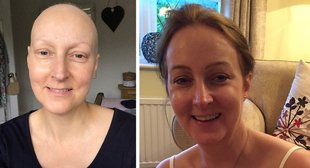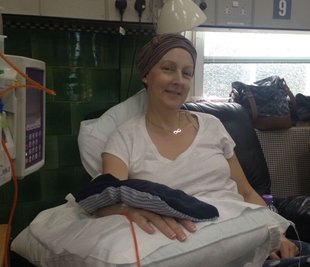Sarah Passby: "I am really well and back to living a normal life"

Sarah
Sarah Passby was diagnosed with stage 3a ovarian cancer in March 2016 and underwent chemotherapy. She shares her story and explains why she is so passionate about raising awareness of the disease.
Update May 2019
"I am really well and back to living a normal life. I feel it’s important for women to know that an ovarian cancer diagnosis does not mean an immediate death sentence. That there are lots of us surviving late-stage diagnosis.
December 2016
"I first started to feel quite poorly in August 2015. I had previously been to the doctors with tummy pains and what I thought were menopausal symptoms.
I was given hormonal treatment but by December I was feeling really rough. I had a swollen tummy, pain and bloating. I'd lost weight and was feeling full after eating even small meals.
I was given medication for IBS and menopause. It was even suggested that I might have a grumbling appendix.
I saw a urologist who thought I had uterus infection. I was given strong antibiotics, which made me very ill.
In March 2016 I saw a locum and he decided to do a routine blood test. I received a phone call from my GP that night saying she thought it could be ovarian cancer.
I was in complete shock – it had never crossed my mind it could be ovarian cancer. I hadn't googled my symptoms but looking back I wish I had.
A CT scan and X-ray followed, then I saw a consultant in Oxford and had an operation in May 2016. I was diagnosed with stage 3a ovarian cancer.
I’m currently undergoing six sessions of chemotherapy and I can't say it’s been easy, but I haven't been at all upset about losing my hair.
I have a wig but I haven’t worn it yet, I wear a hat if I’m going out. I miss my normal life so much and I know I will never take anything or anyone for granted again. Not taking part in my normal life and not working has been the hardest part.

Sarah in hospital having treatment
Awareness of ovarian cancer is very poor. There isn't any information on my doctor’s notice boards and I don't know anyone else who has had it. I hadn't even heard anyone mention it before I was diagnosed. If each doctor’s surgery just had a poster up on its waiting room walls it would really help.
I also think it’s really important for GPs to listen to their patients, especially if they are not a frequent visitor to the surgery. I had very rarely gone to the doctors previously.
I feel that the symptoms along with my age should really have triggered questions. Not every symptom is menopause at this age.
I've been lucky enough to have lots of emotional support, but many others aren't so lucky. For women that live alone, are elderly, frail, or have no family to support them, it must be incredibly difficult – emotionally mentally and physically.
I'm nearing the end of my treatment and I hope it's going to be a New Year and a new start. I don't know what the future holds for me but I won't be sitting back to wait! I have an appointment in January for genetic testing. I have two sisters and a daughter so I have ensured they know all the symptoms. It's so important to awareness of ovarian cancer as an early diagnosis can save lives."
Are you worried about your family history of ovarian cancer? Visit our BRCA Hub to find out more about genetic mutations and hereditary risk.